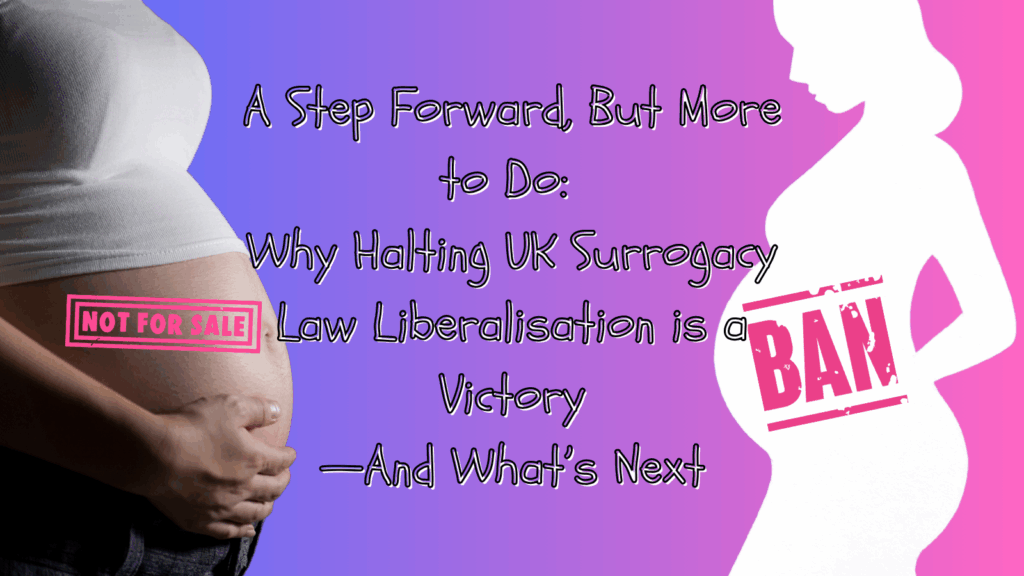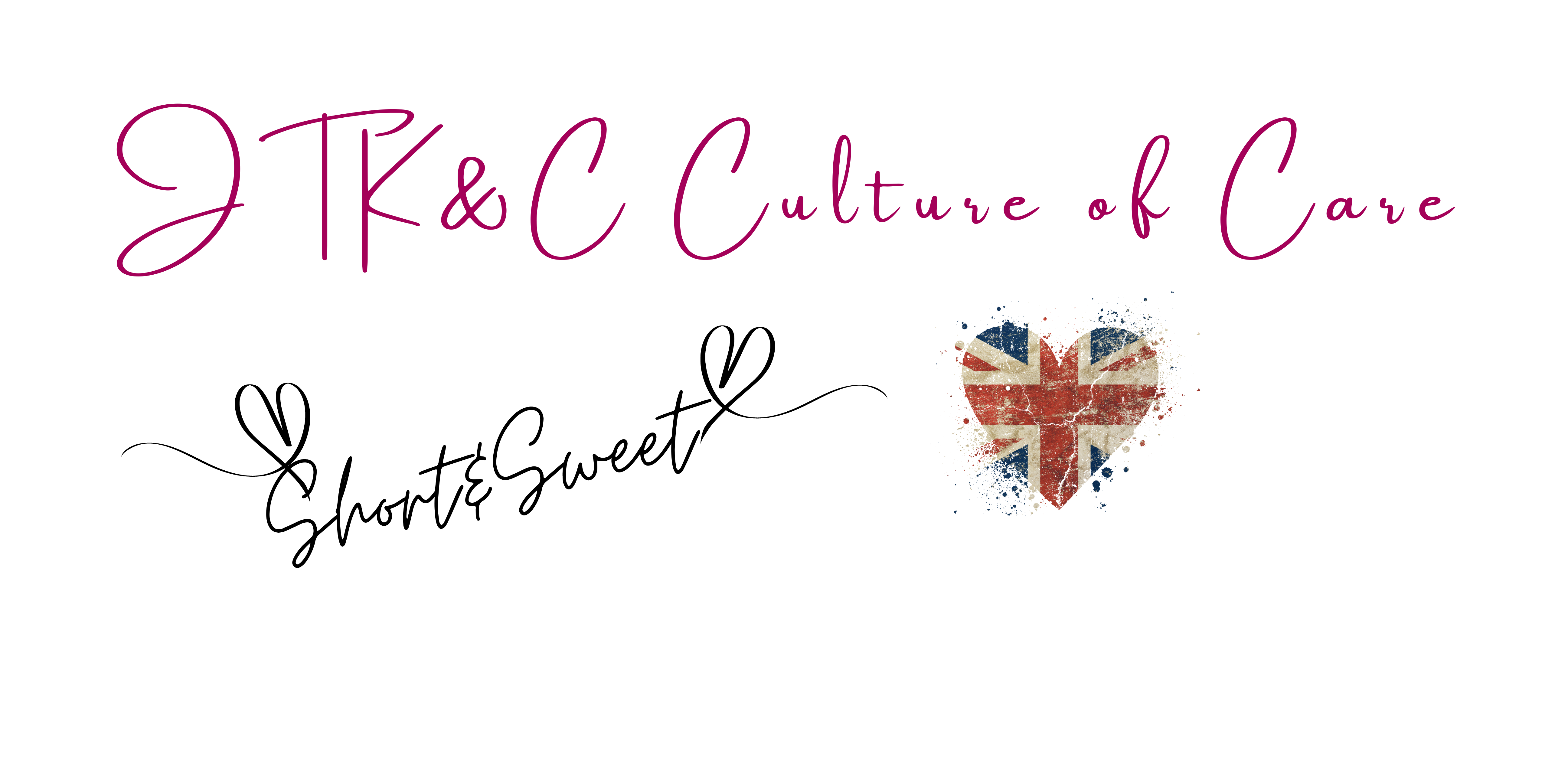On May 8, 2025, the Labour Government announced it would not pursue the liberalisation of domestic surrogacy laws, a decision hailed as a significant win for advocacy groups like Surrogacy Concern. The announcement, shared via an X post by Surrogacy Concern (@SurrogConcern, 2025), reflects years of campaigning by organisations such as Nordic Model Now and Wombs Not For Rent, who argue that surrogacy inherently exploits women and commodifies children. While this decision marks a crucial step in protecting vulnerable women and babies, the fight against surrogacy is far from over. The global surrogacy industry continues to thrive, often at the expense of the most marginalised, and greater efforts are needed to raise awareness of its harms and push for a complete ban. This article explores why this development is a positive move, the ongoing risks of surrogacy, and the actionable steps needed to further protect women and children.

A Victory for Advocacy and Ethical Concerns
The Labour Government’s decision to shelve surrogacy law reforms, as reported by The Times (2025), comes after sustained pressure from groups like Surrogacy Concern, who celebrated the news as a “victory for women & children everywhere. The proposed reforms by the Law Commission, initially expected in 2023, would have made intended parents the legal guardians of a surrogate child from birth and allowed clearer rules on payments to surrogates (The Times, 2025). Critics, however, argued that such changes would normalise a practice fraught with ethical issues, including the exploitation of women and the commodification of children.
The ethical concerns surrounding surrogacy are well-documented. The Heritage Foundation (2025) highlights tragic cases like that of Michelle Reaves, a California surrogate who died during delivery in 2024, leaving behind two children and a devastated family. Such incidents underscore the physical and emotional toll on surrogate mothers, often driven by financial desperation. Moreover, surrogacy can lead to distressing outcomes for children, such as identity struggles due to severed biological ties—a concern the Law Commission’s proposed register for tracing origins aimed to address but remains unimplemented. By halting liberalisation, the UK government has acknowledged these risks, prioritising the welfare of women and children over the demands of the fertility industry……for now.
The Global Exploitation of Vulnerable Women
While the UK maintains a ban on commercial surrogacy, the global landscape tells a different story. Countries like India and Thailand have closed their borders to international surrogacy due to rampant exploitation, pushing the industry to nations like Ukraine and Mexico (The Times, 2025; Heritage Foundation, 2025). In Ukraine, which now holds over a quarter of the global surrogacy market, reports of child abandonment and surrogate abuse are alarmingly common. A 2020 incident in Kiev saw dozens of surrogate babies stranded in a hotel due to pandemic-related travel restrictions, exposing the chaos and ethical violations in cross-border arrangements.
The lack of reform in the UK exacerbates this issue. Current laws, described as “outdated and not fit for purpose” by the Law Commission, fail to address the complexities of modern surrogacy. As a result, British couples are increasingly turning to unregulated markets abroad, where women in poverty are often coerced into surrogacy by financial need. The Surrogacy Arrangements Act 1985, while prohibiting commercial surrogacy in the UK, does little to prevent citizens from exploiting women in countries with weaker protections. This gap in legislation underscores the need for stronger measures to curb international surrogacy.
What’s Next: Raising Awareness and Preventing Surrogacy
The decision to halt surrogacy law liberalisation is a critical first step, but advocacy groups must build on this momentum to address the broader harms of surrogacy. Below are key strategies to raise awareness and work toward a total ban on the practice.
Educate the Public with Real-Life Stories
Public awareness campaigns should centre on the lived experiences of women and children harmed by surrogacy. The Heritage Foundation (2025) references cases presented at the UN Commission on the Status of Women, where survivors shared stories of trafficking, infertility, and emotional trauma caused by surrogacy. By amplifying these voices—through documentaries, social media campaigns, and public forums—advocates can shift public perception and highlight the human cost of the practice. Surrogacy Concern’s X thread already demonstrates the power of community engagement, with supporters like Nordic Model Now and Wombs Not For Rent @StumpyRabbitt and @Serena_Partrick praising their efforts (@SurrogConcern, 2025). Expanding this narrative to a wider audience is essential.
Advocate for Stricter International Laws
The UK must take a stronger stance against international surrogacy, following the example of Italy, which in 2024 passed a law to prosecute citizens who pursue surrogacy abroad (Wikipedia, 2025). Thirteen campaign groups, including Surrogacy Concern and For Women Scotland, have already called for similar measures in the UK, urging the government to make it illegal for Britons to engage in international surrogacy arrangements (The Times, 2025). Advocacy efforts should focus on lobbying policymakers to adopt these restrictions, ensuring that the exploitation of women in poorer countries is not perpetuated by UK citizens.
Engage Legal Experts in Public Discourse
Legal professionals have been vocal about the shortcomings of current surrogacy laws. Solicitors like Lucy Hitchen of Ribet Myles and Emma Dewhurst of Hall Brown Family Law have criticised the government’s inaction, warning that outdated legislation drives couples to unregulated markets abroad. Inviting these experts to speak at public forums, webinars, and media outlets can amplify the call for a total ban. Their insights can bridge the gap between legal complexities and public understanding, emphasising how the lack of reform fails to protect vulnerable women and children.
Highlight the Impact on Child Welfare
The distress caused to babies born through surrogacy must be a focal point of awareness campaigns. Children often face identity struggles due to their inability to trace their biological origins, a problem exacerbated by the absence of a national register for surrogate children (The Times, 2025). Advocacy groups should collaborate with organizations like Them Before Us and the Center for Bioethics and Culture, which work to elevate the voices of children affected by surrogacy (Heritage Foundation, 2025). By focusing on the long-term emotional and psychological impact on children, campaigners can build a compelling case for banning the practice entirely.
Collaborate with Global Movements
The fight against surrogacy requires a unified global effort. UK advocates should partner with international groups like Stop Surrogacy Now UK and the Women’s Rights Network, who co-signed the letter urging a ban on international surrogacy (The Times, 2025). These partnerships can strengthen advocacy efforts, sharing resources and strategies to pressure governments worldwide to regulate or ban surrogacy. The Hague Conference’s Experts’ Group on the Parentage/Surrogacy Project, which is exploring international standards to protect women and children, offers a platform for such collaboration (Heritage Foundation, 2025).
Expose the Profit-Driven Fertility Industry
The global surrogacy industry, valued at billions of dollars, often targets vulnerable women with financial incentives, perpetuating a cycle of exploitation. Advocacy campaigns should expose the profit motives behind the industry, revealing how companies prioritise revenue over the well-being of women and children. For example, Ukrainian surrogacy firms have been criticised for abandoning babies and neglecting surrogates, yet face little regulation due to the economic benefits they bring. By highlighting these practices, campaigners can challenge the narrative that surrogacy is a benevolent solution to infertility.
Conclusion: A Long Road Ahead
The Labour Government’s decision to halt the liberalisation of UK surrogacy laws is a significant victory for those who recognise the harms of surrogacy. It reflects the power of grassroots advocacy and sends a message that the exploitation of women and children will not be normalised under the guise of reform. However, the battle is far from won. The global surrogacy industry continues to exploit vulnerable women, and the UK’s outdated laws inadvertently fuel this cycle by driving couples to unregulated markets abroad. To truly protect women and children, advocacy groups must intensify their efforts—raising awareness through education, pushing for stricter laws, engaging legal experts, and collaborating globally. Only through sustained action can we hope to dismantle the surrogacy industry and prevent its devastating impact on the most vulnerable.
The Times (https://www.thetimes.com/uk/law/article/ministers-put-surrogacy-reforms-on-back-burner-m9kwrwh8g) has broken the story above, and you can see a letter from the Minister for Women’s Health, Baroness Merron, here confirming liberalisation of the law will not be taken up (for now) here:
References
- @SurrogConcern. (2025, May 8). BREAKING: Labour Government confirm they DO NOT intend to pursue liberalisation of domestic surrogacy law at the present time. X. https://x.com/SurrogConcern/status/1920416446368071742
- Heritage Foundation. (2025). How Surrogacy Harms Women and Children. www.heritage.org
- The Times. (2025). Ministers put surrogacy reforms on back burner. https://t.co/6jUFUtL2ny
- https://jenkteach.co.uk/surrogacy-must-stop/
- https://jenkteach.co.uk/italy-bans-surrogacy-it-will-be-rightfully-treated-as-human-trafficking/
- https://jenkteach.co.uk/ukraines-baby-factories-rake-in-record-profits-amid-chaos-of-war/
- Wikipedia. (2025). Surrogacy laws by country. https://en.wikipedia.org/wiki/Surrogacy_laws_by_country
